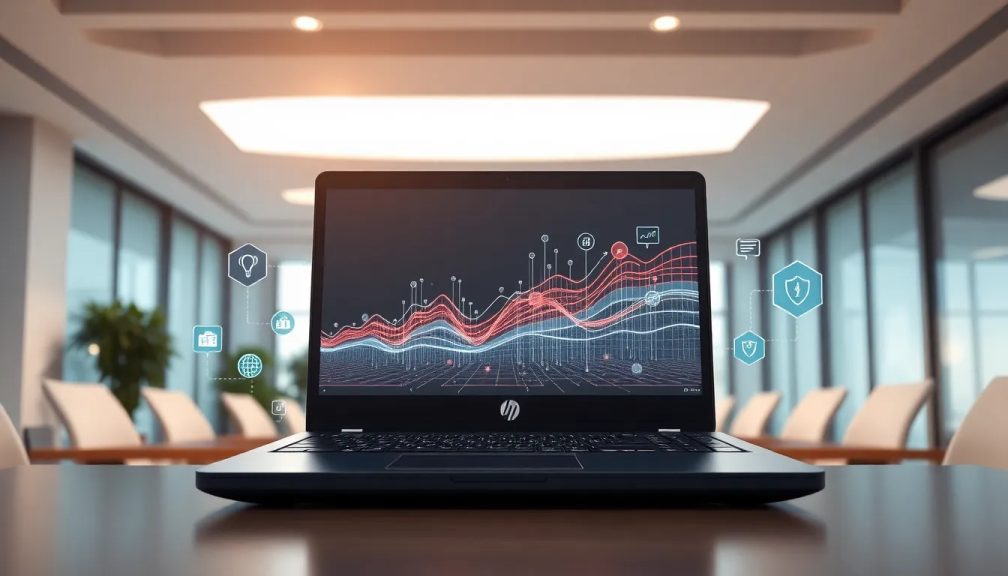HP's Focus on Security and AI Enhances PC Performance

The landscape of cybersecurity is rapidly evolving, with threats becoming more sophisticated and deceptive. As the digital battleground intensifies, companies must sharpen their focus to stay ahead. HP is at the forefront of this challenge, emphasizing security and artificial intelligence (AI) in its product offerings. This article delves into how HP’s strategic focus on these areas is shaping the future of personal computing and redefining security standards.
- HP's Commitment to Security and AI
- Evolving Threat Landscape: A Closer Look
- HP's Strategic Advantage in a Competitive Market
- HP Wolf Security: A New Paradigm in Cybersecurity
- The Rise of the AI PC: An Intersection of Security and Performance
- Best Practices for Enhancing Your Digital Security
- HP's Future: Leading the Charge in AI and Security
HP's Commitment to Security and AI
In an age where cyberattacks are increasingly prevalent, HP's recent report from HP Wolf Security highlights a stark reality: attackers are not only developing new methods but are also fine-tuning their existing strategies. This evolution of threat actors calls for an equally robust response from technology providers.
HP’s concentrated approach to the PC ecosystem is not merely a tactic; it is a strategic advantage that positions the company as a leader in cybersecurity and AI integration. The firm’s commitment to enhancing its products with advanced security features is pivotal, especially as the demand for AI-enabled devices grows.
Evolving Threat Landscape: A Closer Look
The latest findings from HP Wolf Security reveal alarming trends among cybercriminals. They are increasingly utilizing "living-off-the-land" (LOTL) techniques, which involve exploiting legitimate tools already present within the Windows operating environment. This tactic complicates the detection of malicious activities, presenting a significant challenge for security teams.
As Ian Pratt, HP's global head of security for personal systems, points out, distinguishing between genuine user actions and malicious activities is becoming more complex. Some notable tactics include:
- Sophisticated Phishing Schemes: Attackers are crafting emails that appear legitimate, utilizing fake documents that mimic well-known applications. These carefully designed files can execute harmful scripts without raising immediate suspicion.
- Hidden Malware Payloads: Malicious software can be concealed within standard file formats, making detection by traditional antivirus software exceedingly difficult. For example, files disguised as project documents may leverage system tools to execute harmful commands while erasing any traces of their activity.
- The Resurgence of Stealer Malware: Tools like the Lumma Stealer have returned, utilizing compression techniques to bypass security measures. This highlights the constant evolution of malware tactics, adapting to circumvent detection systems.
HP's Strategic Advantage in a Competitive Market
HP's focused strategy on personal computing distinguishes it from competitors like Dell Technologies, which diversify into various areas including cloud services and enterprise solutions. This singular dedication allows HP to channel its resources into developing cutting-edge security features that protect end-users effectively.
Since separating from Hewlett Packard Enterprise (HPE), HP has honed its engineering and research capabilities directly towards enhancing the security of personal devices. This concentration fosters a deeper understanding of user needs and the specific challenges faced in endpoint security.
For HP, the personal computer is more than just another product line; it is the core of the business. This perspective drives the company to lead in innovation and reliability, ensuring that security is always paramount in the development process.
HP Wolf Security: A New Paradigm in Cybersecurity
HP Wolf Security represents a groundbreaking shift in how cybersecurity is approached. Unlike traditional antivirus solutions that rely on threat detection, HP adopts a Zero Trust model. This model operates under the assumption that threats can breach initial defenses, emphasizing containment and isolation.
Through techniques such as micro-virtualization, HP can safely open potentially harmful attachments and links within isolated containers. This means that even if malware is activated, it cannot affect the underlying system or access sensitive user data.
The approach aligns perfectly with the LOTL techniques identified in HP's threat report, illustrating how HP's innovations in security are designed to combat contemporary threats.
The Rise of the AI PC: An Intersection of Security and Performance
As the tech world shifts towards the era of artificial intelligence, HP’s focus on personal computing positions it well to lead in this new venture. The AI PC is characterized by its ability to run sophisticated generative AI models locally, thanks to the incorporation of neural processing units (NPUs) alongside traditional processors.
Achieving this requires an intricate balance of hardware and software, making HP's deep knowledge of PC architecture invaluable. As users begin to leverage AI on their devices, the need for robust security will only intensify. The personal computer will be an attractive target for malicious actors, necessitating devices that are not only powerful but also fortified against attacks.
HP's long-term commitment to hardware-based security provides a significant advantage in this burgeoning market. The success of HP Wolf Security builds trust, ensuring that users prefer platforms that excel in AI capabilities while also safeguarding their data.
Best Practices for Enhancing Your Digital Security
While HP and other companies are making strides in device security, individual users must also take proactive measures to protect themselves. The threats highlighted in the HP Wolf Security report often exploit human behavior. Here are some practical steps you can take to enhance your security:
- Be Skeptical: Treat unsolicited emails and attachments with caution. Always verify the source before clicking on links or downloading files.
- Keep Software Updated: Regularly update your operating system and applications to patch security vulnerabilities.
- Utilize Strong Passwords and MFA: Create unique passwords for different accounts and enable multi-factor authentication to add an extra layer of security.
- Invest in Secure Hardware: When purchasing new devices, prioritize those with built-in security features, such as hardware-based isolation and protection.
HP's Future: Leading the Charge in AI and Security
The insights from the HP Wolf Security report underscore the changing dynamics of cyber threats, emphasizing the need for continual evolution in both technology and strategy. HP’s unwavering commitment to enhancing the security of personal computing devices is crucial, not just for its business model, but for the safety of users worldwide.
By pioneering new security measures and focusing on the evolving demands of AI integration, HP is positioning itself as a leader in the next wave of technological advancement. As we move forward, the interplay between performance and security will be foundational to the success of personal computers in the AI era.
As a side note, the automotive industry is also innovating in fascinating ways. For instance, Audi's Concept C, expected around 2027, is generating buzz with its bold design and advanced technology. This vehicle exemplifies the future of electric sports cars, blending aesthetics with high-performance capabilities.
Check out this video that explores how AI is reshaping our daily tasks and interactions:
The future of both computing and transportation is undeniably exciting, and the advancements being made today are shaping a safer, more efficient tomorrow.




Leave a Reply